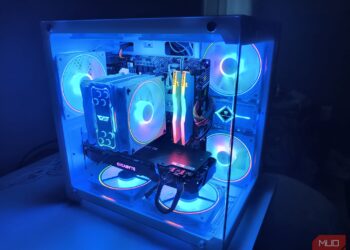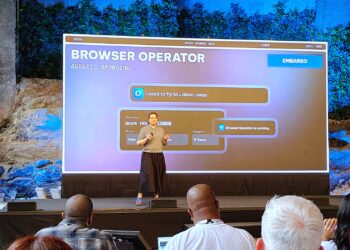Main Points
- The Raspberry Pi AI Camera is equipped with hardware designed for on-device AI processing.
- It can perform various computer vision tasks such as semantic segmentation, pose estimation, and object detection.
- Integrating machine learning for different applications is straightforward.
The Raspberry Pi AI Camera empowers nearly any Raspberry Pi model with artificial intelligence capabilities. Thanks to its neural processing hardware, the AI camera efficiently handles computations right on the device, enabling an increased range of AI projects with your Raspberry Pi.
Augmented Reality Streaming
I’ve always been interested in streaming on Twitch for fun, but I’m notoriously camera-shy and privacy-conscious. Sure, I could create a 3D avatar to represent me online, but I’ve got no desire for my avatar to look like a werewolf or Sonic the Hedgehog—no shade to those who do, though.
Is there a middle ground between fully revealing my true self and creating an entirely fictional avatar? The Raspberry Pi AI Camera may provide the perfect solution with its augmented reality (AR) streaming capabilities.
This AI camera is capable of semantic segmentation—a sophisticated way of saying that it can understand the significance of each pixel in a video feed. Its rapid processing could allow for the seamless application of AR overlays.
Perhaps I could use an AR filter to showcase a high-tech helmet reminiscent of the ones worn by ADVENT officers in XCOM. That would obscure my eyes and hair while leaving the rest of my face and body visible. I could also enhance the backdrop to make my ordinary bookshelf appear as if it’s part of a spaceship’s interior.
The Raspberry Pi AI Camera is an excellent tool for demonstrating the potential of extended reality applications. Sure, it might require considerable effort just to amuse a handful of viewers, but hey, one can dream.
DIY Party Photo Booth
What’s the best way to bring life to a party with friends or family gatherings? You might think the answer is drinks, but I would argue that a party photo booth is even more entertaining.
However, renting a photo booth for smaller gatherings isn’t exactly practical. It can rapidly become quite costly and involves the hassle of transporting equipment. That’s where the Raspberry Pi AI Camera comes into play.
Since it operates without the need for a GPU or external Tensor Processing Unit, the Raspberry Pi AI Camera is compact enough to easily set up a DIY photo booth whenever I want.
Here’s everything I’d need to create one:
The Pi AI Camera can analyze pose estimation, allowing it to recognize how people are positioned or gesturing. It can automatically suggest fun props—like lightsabers or animated hearts—based on what it sees in the image.
If anyone shows up to our New Year’s Eve celebration and labels my booth as nerdy, I’ll just point out that it’s certainly better than snapping photos like it’s the late ’90s.
Automated Wildlife Album
Living in a wildland-urban interface, my partner and I frequently encounter deer, foxes, and an array of beautiful hummingbirds that remain unidentified. Instead of relying on binoculars or vague Google searches for identification, I plan to let the Raspberry Pi AI Camera assist me in this task.
There are already remarkable projects utilizing a standard Raspberry Pi, but integrating the AI Camera will enable me to efficiently run neural network models. This addition allows for straightforward incorporation of machine learning tools—including apps that utilize TensorFlow or PyTorch—elevating the potential for Raspberry Pi and camera projects.
This setup would allow me to indulge my inner lazy nature photographer. Here’s my vision for an AI-driven wildlife album:
- The Raspberry Pi AI Camera will use object detection to capture images of the wildlife, insects, and lizards that wander past.
- The AI will strive to automatically identify the species.
- Captured photos and identification details will be compiled in a wildlife album.
- Machine learning will enhance the album’s accuracy as it’s refined with additional data from the camera over time.
Maybe I’ll finally unravel the mystery of what’s been munching on our azaleas late at night. Even the sneaky voles won’t stand a chance against the AI revolution.







